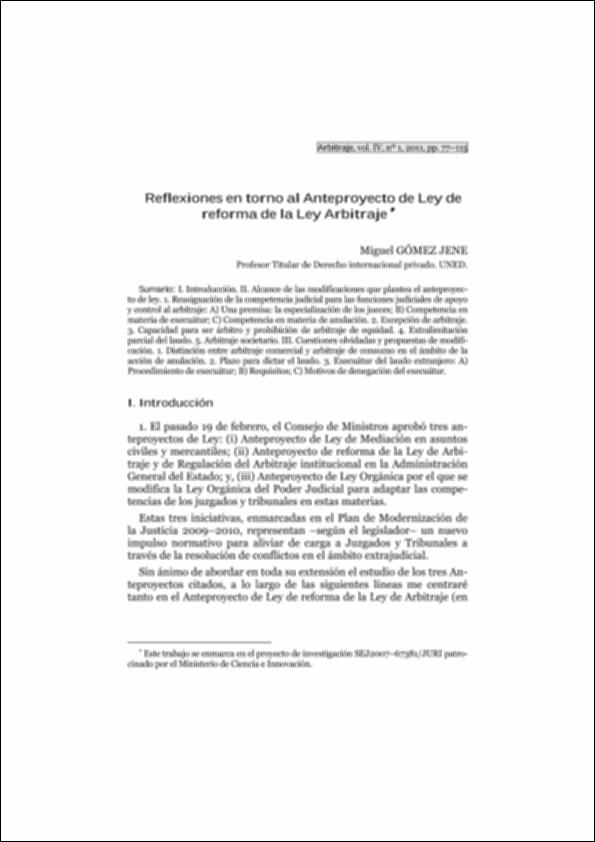Please use this identifier to cite or link to this item:
http://hdl.handle.net/10637/12963Reflexiones en torno al Anteproyecto de Ley de reforma de la Ley de Arbitraje.
| Title: | Reflexiones en torno al Anteproyecto de Ley de reforma de la Ley de Arbitraje. |
| Authors : | Gómez Jene, Miguel |
| Keywords: | Anteproyecto de ley de la Reforma de la Ley de Arbitraje.; Tribunales competentes.; Excepción de arbitraje.; Arbitraje de equidad.; Arbitraje societario.; Plazo para dictar el laudo.; Anulación del laudo.; Execuátur del laudo arbitral extranjero. |
| Abstract: | El Anteproyecto de Ley de Arbitraje que ha presentado el legislador plantea reformas de distinto calado. Probablemente la más interesante es la que gira en torno
a la nueva competencia que asumen los Tribunales Superiores de Justicia para conocer de
la acción de anulación y del execuátur del laudo arbitral extranjero. Pero también destaca
el nuevo cauce que prevé para hacer valer la excepción de arbitraje –distinto del cauce de
la declinatoria–; la prohibición del arbitraje de equidad; el cambio de las condiciones que
requiere el árbitro para formar parte del colegio arbitral; y, la nueva regulación para supuestos de extralimitación parcial del laudo. El lado más oscuro de esta reforma se encuentra, sin embargo, en la propuesta de regulación del arbitraje societario, pues impone,
sin necesidad de hacerlo, el arbitraje institucional y la unanimidad de los socios para
incluir un convenio arbitral en los estatutos de una sociedad limitada.
Además de realizar un estudio pormenorizado de todas y cada una de las propuestas
que afectan al arbitraje; este trabajo incluye –y justifica– una serie de propuestas relativas
a la distinción entre el arbitraje de consumo y el arbitraje comercial, el procedimiento de
execuátur y el plazo para dictar el laudo. The Bill to amend the Arbitration Act submitted by the lawmaker introduces reforms on different grounds. The most interesting one might be arguably that concerning the new jurisdiction of the Spanish Tribunales Superiores de Justicia to deal with the annulment and exequatur proceedings of arbitral awards. But it also introduces a new procedure to uphold the arbitration exception –different from the jurisdictional plea–; the prohibition of arbitration in equity; the change of the conditions for an arbitrator to become part of the arbitral panel, and the new rules for the cases of partial abuse of the award. Nevertheless the most controversial aspect of the reform is the proposal of rules for the company arbitration since not only imposes an institutional arbitration since not only imposes an institutional arbitration but also the unanimity among the shareholders to include an arbitral convention in the by–laws of the limited liability. This essay provides a detailed analysis of all the proposals affecting arbitration matters and includes a series of indications related to the distinction between consumer arbitration and commercial arbitration, the exequatur procedure and the period of time to render the award. |
| Description: | En: Arbitraje: revista de arbitraje comercial y de inversiones. eISSN. 2603-9281. vol. 4, n. 1, 2011, pp 77-115 |
| URI: | http://hdl.handle.net/10637/12963 |
| Rights : | http://creativecommons.org/licenses/by-nc-nd/4.0/deed.es |
| Issue Date: | 4-Apr-2011 |
| Appears in Collections: | 2011 Arbitraje nº 1 |
Items in DSpace are protected by copyright, with all rights reserved, unless otherwise indicated.


